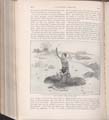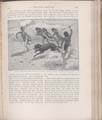
stnic.190303.001.001.jpg
A MINIATURE CHIEFTAIN
ONCE upon a time, away out in New Mexico, in one of the old pueblos on the Rio Grande, there was a young warrior born among tillers of the soil. His father had been left at the pueblo by a wandering band of Utes because he was too sick to travel. Upon his recovery, he liked the life, and determined to cast his lot with the Pueblo tribe. A council of the governor and his twelve subchiefs was held, he was received into the tribe, and a small piece of land apportioned out to him. The Ute married a Pueblo maiden, and their first son was named Agoya— the little warrior mentioned at the beginning of this story.
Agoya's first exploits had been with a couple of bear-cubs that he used as playfellows, and frequent were the rough-and-tumble fights he had had with them.
When I went out to live with his people, the young brave had passed his eighth winter, and was a straight, manly little fellow. I noticed him at once among the band of small Pueblo boys, as he was quite different from them in build and looks. He had all the characteristics of the nomad or roving Indian, while his Pueblo playmates were like their own peace-loving tribe. He was reserved and dignified, with a quick temper, which he controlled in a way quite beyond his years, although sometimes it would flare up, as it did one day when he heard the click of [illustration - "Agoya's first exploits had been with a couple of bear cubs."] my camera as I took a snap-shot at a group of boys among whom he was standing. He had a dread of the camera, and it made him very angry. We were too good friends to quarrel, but he felt he must punish some one, so, like a flash, he jumped on the nearest boy, whom he sent rolling on the ground in no time. But, with all his pride and temper, he was a generous boy.
My interest in him was no greater than his in me, and we soon became very good
friends. He would follow me on long tramps when I was out with my gun, and he
took great delight in picking up the game, always stealing up and planting one
of his

stnic.190303.001.002.jpg tiny arrows in the bird or beast, and then
rushing in and seizing it, in true warrior style.
Our hunts were silent, as neither understood the other's language; but he comprehended every motion I made, and there was a bond of sympathy between us, the love of nature that made our trips very pleasant. This small brave had a knowledge of nature that would put to shame most civilized boys of twice his years. Many times he took the lead, and seldom failed to find what he was after.
Sometimes we would take our ponies across the river, and ride up into the canons, spending the day wandering about the little parks, or climbing to the almost inaccessible prehistoric [illustration - He would follow me on long tramps when I was out with my gun, and he took great delight in picking up the game.] stone villages on top of the mesas, there to hunt for stone arrow-tips, axes, and other remains of the old Pueblos. His eyes were very keen, and many were the additions he made to my collection. All the time the spirit of the hunter was uppermost in him; no animal was too small to attract his attention, and then the craft of his hunting ancestors would come forth. He would glide upon the game with the stealth of a cat, and more than once he came strutting back with a bird or little cottontail tied to his belt.
The little Ute was a leading spirit among the little docile Pueblo boys, whom he ruled like a chief, and many were the forays he led against stray dogs from another village. Even in the adult dances his small figure, dressed in regular dance costume, would be seen bobbing up and down in perfect time to the beat of a drum.
During the hot, dry summer weather the people slept on their roofs, and with the first streak of light in the east the pueblo was astir. Down in the plaza, the children would be playing at their various games, many of them with little brothers or sisters strapped to their backs. Among them, leading in some heroic sport, I would always see my miniature chieftain.

stnic.190303.001.003.jpg
One evening, as the shadows lengthened and the wind subsided, I went around behind a sandstone butte that stood up from the plain like an old castle, and climbed on top, where [illustration - Suddenly there were shrill war-whoops and yells. A big dog, rushing out, made for the village.] I could, unobserved, watch the manoeuvers of these miniature warriors. Upon reaching the summit I saw the band sneaking along through the sage-brush, crouching, and keeping a sharp lookout for an imaginary enemy. In the lead was Agoya. He made a motion with his hand, and the boys disappeared like a flock of young quail. Presently I saw the little Ute crawl cautiously through the sage, stop, gaze intently at some object lying in a bunch of grass, and crawl back to his comrades. Soon the little dark figures surrounded the enemy, bows drawn, miniature spears and tomahawks in readiness. Suddenly there were shrill war- whoops and yells. A big dog, rushing out, made for his own village, yelping at every jump. He had come to forage upon the enemy's camp, but Agoya and his band soon drove him off. It was a glorious victory for the warriors, and all without the loss of a man.
Such a victory had to be celebrated, and soon they were in the midst of a scalp-dance in exact imitation of their elders, with bunches of long grass to imitate scalps, tied to sticks and carried by several of their number, while the others danced about them. In a short time they were off again, and the last I saw of the valiant leader and his band, they were having a great buffalo-hunt, as they had surrounded an old bleached buffalo skull, which was attacked with great vigor, and, I have no doubt, furnished a goodly supply of imaginary buffalo-meat for the little savage band.